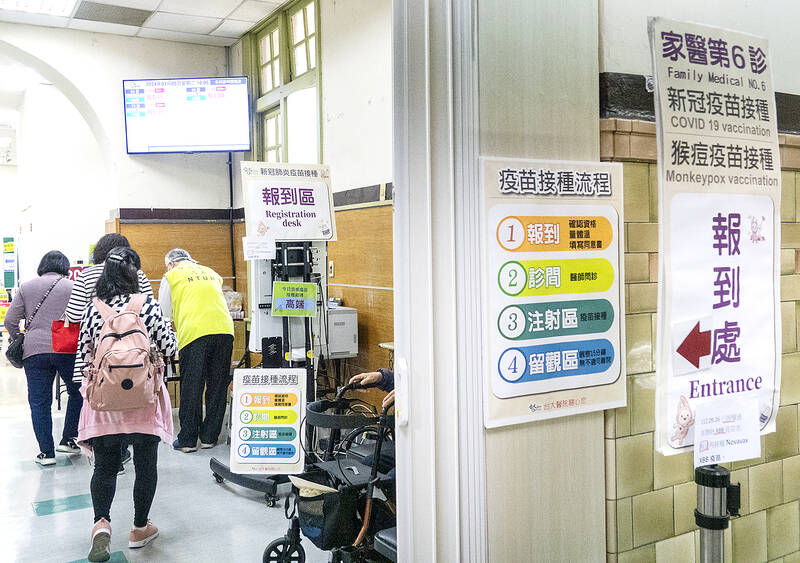Hospitalizations due to COVID-19 last week increased 30.9 percent from a week earlier, while hospital visits due to enterovirus increased 5.7 percent, the Centers for Disease Control (CDC) said yesterday, adding that Taiwan has again entered the epidemic stage for influenza.
Last week, 817 people were hospitalized due to COVID-19, an increase of 30.9 percent from 624 cases a week earlier, CDC Epidemic Intelligence Center Director Guo Hung-wei (郭宏偉) said.
Forty people died from COVID-19 last week, slightly more than the 38 reported the previous week, he said.

Photo: CNA
Domestic COVID-19 activity has been rising for five consecutive weeks, but the increase in hospitalizations last week was lower than the previous two weeks, CDC Deputy Director-General Tseng Shu-hui (曾淑慧) said.
A CDC simulation predicted that the number of weekly hospitalizations could peak in the middle of next month, while COVID-19 activity might plateau in the second half of next month, with case numbers gradually dropping after one to two months, she said.
Meanwhile, a physician on Monday shared on Facebook a screen grab of a notification, presumably from the National Health Insurance prescription system, informing him that he could not prescribe Molnupiravir as there is a shortage.
The physician asked why the CDC previously said there was no shortage of oral antiviral drugs for COVID-19.
Molnupiravir is listed for conditional use, and is limited to people who cannot take Paxlovid because of health conditions, Tseng said.
As of Saturday, there were 103,523 courses of Remdesivir, 230,759 courses of Paxlovid and 8,562 courses of Molnupiravir still available, she said.
However, due to an increase in COVID-19 activity, the CDC has purchased 20,000 courses of Molnupiravir, which are expected to arrive on Thursday next week, and would be delivered to hospitals the next day, she said.
Although the previous epidemic period for seasonal flu ended in April, there were more than 95,000 hospital visits for flu-like illnesses last week, and about 12 percent were at emergency departments, Tseng said.
The epidemic threshold for seasonal flu is when 11 percent or more of the hospital visits for flu-like illnesses are at emergency departments, and that figure was more than 11 percent for four consecutive weeks, meaning Taiwan entered the flu epidemic period at the beginning of this month, she said.
The flu epidemic period usually falls in winter, with summer epidemics being less common, Tseng said, adding that the last summer epidemic was recorded in the 2016 to 2017 flu season.
As children are expected to visit more public spaces during the summer vacation, the CDC reminds parents and caregivers to pay close attention to their health and help them practice good hygiene, she said.
There were also 18,931 hospital visits for enterovirus last week, a 5.7 percent increase from the previous week, Guo said.
Coxsackie A virus has been the main strain circulating around Taiwan over the past four weeks, he added.

Nipah virus infection is to be officially listed as a category 5 notifiable infectious disease in Taiwan in March, while clinical treatment guidelines are being formulated, the Centers for Disease Control (CDC) said yesterday. With Nipah infections being reported in other countries and considering its relatively high fatality rate, the centers on Jan. 16 announced that it would be listed as a notifiable infectious disease to bolster the nation’s systematic early warning system and increase public awareness, the CDC said. Bangladesh reported four fatal cases last year in separate districts, with three linked to raw date palm sap consumption, CDC Epidemic Intelligence

The manufacture of the remaining 28 M1A2T Abrams tanks Taiwan purchased from the US has recently been completed, and they are expected to be delivered within the next one to two months, a source said yesterday. The Ministry of National Defense is arranging cargo ships to transport the tanks to Taiwan as soon as possible, said the source, who is familiar with the matter. The estimated arrival time ranges from late this month to early next month, the source said. The 28 Abrams tanks make up the third and final batch of a total of 108 tanks, valued at about NT$40.5 billion

Two Taiwanese prosecutors were questioned by Chinese security personnel at their hotel during a trip to China’s Henan Province this month, the Mainland Affairs Council (MAC) said yesterday. The officers had personal information on the prosecutors, including “when they were assigned to their posts, their work locations and job titles,” MAC Deputy Minister and spokesman Liang Wen-chieh (梁文傑) said. On top of asking about their agencies and positions, the officers also questioned the prosecutors about the Cross-Strait Joint Crime-Fighting and Judicial Mutual Assistance Agreement, a pact that serves as the framework for Taiwan-China cooperation on combating crime and providing judicial assistance, Liang

A group from the Taiwanese Designers in Australia association yesterday represented Taiwan at the Midsumma Pride March in Melbourne. The march, held in the St. Kilda suburb, is the city’s largest LGBTQIA+ parade and the flagship event of the annual Midsumma Festival. It attracted more than 45,000 spectators who supported the 400 groups and 10,000 marchers that participated this year, the association said. Taiwanese Designers said they organized a team to march for Taiwan this year, joining politicians, government agencies, professionals and community organizations in showing support for LGBTQIA+ people and diverse communities. As the first country in Asia to legalize same-sex